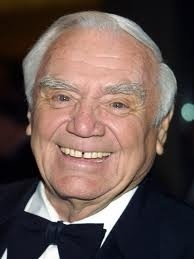 When we started this web site Mike G. and I both had a “wish list” of celebrities we’d like to interview. One of the ones on mine was Ernest Borgnine. Over the years we played cat and mouse, trying to nail down a time when he wasn’t working. I actually came within 20 minutes of speaking with him when he was recalled back to the set of the film he was working on for re-shoots. I can remember receiving an email from his manager a few months ago telling me that, because of my patience and perseverance, he would try to put Ernie and I in touch with each other. Sadly, that conversation will never take place. Mr. Borgnine passed away today from renal failure. He was 95.
When we started this web site Mike G. and I both had a “wish list” of celebrities we’d like to interview. One of the ones on mine was Ernest Borgnine. Over the years we played cat and mouse, trying to nail down a time when he wasn’t working. I actually came within 20 minutes of speaking with him when he was recalled back to the set of the film he was working on for re-shoots. I can remember receiving an email from his manager a few months ago telling me that, because of my patience and perseverance, he would try to put Ernie and I in touch with each other. Sadly, that conversation will never take place. Mr. Borgnine passed away today from renal failure. He was 95.
Born Ermes Effron Borgnine on January 24, 1917, the son of Charles and Anna, whose families had emigrated to the United States from Italy. Unsure about what career to pursue after graduating high school Borgnine joined the U.S. Navy, where he served for a decade, receiving his discharge in 1945. It was his mother who suggested, because of his personality, that he use his G.I. benefits and study acting. He spent four years working in a local Abingdon, Virginia theatre troupe before making his Broadway debut in 1949 in the show, “Harvey,” which closed shortly after he joined (the show had run for almost five years). He continued to work in NYC until he headed to California, where he made his film debut as the Chinese (!) runner of a gambling club in “China Corsair.”
He continued to work in film and episodic television for the next couple of years. In 1953 he won the role that would establish him as one of the screens most hated characters, Sgt. “Fatso” Judson, in the Oscar winning “From Here to Eternity.” He excelled at playing screen heavies but, in 1955, was cast against type as quiet, lovelorn butcher Marty Piletti in “Marty.” To many Borgnine showed a range they hadn’t imagined. He truly won over his peers because he would go on to win the Academy Award as Best Actor for his performance. He would work steadily for the next six years in film and T.V. until he joined fellow Oscar winners Donna Reed (“The Donna Reed Show”) and Shirley Booth (“Hazel”) in the growing and popular world of television, forgoing his film career to star as Captain Quentin McHale in the naval comedy “McHale’s Navy.”
When the show ended it’s run he returned to the big screen in two major films, 1967’s “The Dirty Dozen” and, two years later, “The Wild Bunch.” In 1972 he was part of an all-star cast featured in the disaster-epic “The Poseidon Adventure.” As policeman Mike Rogo, on honeymoon with his former call girl wife, he gives a virtuoso performance steeped in both macho toughness and devastating heartbreak. SPOILER ALERT: When his wife is killed he breaks down and curses Gene Hackman’s preacher and, through him, God, telling Him, “You took from me the only thing I ever loved in the whole world, my Linda!”
He continued to work steadily for the next four decades, appearing in such television productions as “All Quiet on the Western Front,” “Jesus of Nazareth” and “Hoover,” as well as supporting roles in such shows as “Air Wolf” and “The Single Guy,” as well as such notable films like “Escape From New York,” “The Black Hole,” “Baseketball” and last years spy-drama “RED.” Younger generations will always remember him as the voice of Mermaidman on the animated “Spongebob SquarePants.” I will always remember him as an actor who always amazed and who did what he loved until the day he died. I wish fate would have put us together, even on the telephone. It would have been one of those moments I’d always remember.

